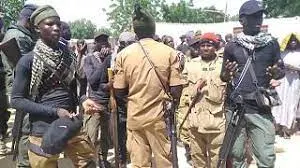A growing number of nurses are leaving the country in search of better prospects. Most of them leave for the United Kingdom or Ireland, others to neighboring countries of Zimbabwe or in the private sector.
According to the Health Services Board , 2,000 healthcare workers left Zimbabwe for countries including the UK, US and Australia in 2021.
The State Health Services Board says just over 2,200 medical staff left its services last year alone: 900 of them were nurses. This is double the number of personnel who left the country in 2020 and triple that of 2019.
Zimbabwe is experiencing its worst economic crisis in decades, with runaway inflation, stagnant wages, widespread poverty and shortages of basic necessities like water and electricity. For the past three years, the health sector has been the scene of sporadic nationwide strikes by health care workers over insufficient pay.
The situation has been aggravated by the COVID-19 pandemic. In 2020, nurses went on strike over shortages of medicines and personal protective equipment (PPE) which affected most medical facilities around the capital Harare.
Nigeria: fighting between a militia and "bandits", at least 57 dead
Northwestern Nigeria was the scene of new deadly fighting between vigilante militia and a criminal group on Monday, with Nigerian President Muhammadu Buhari saying he was "shocked by this extreme level of criminality" which reportedly left more than 57 people dead. according to local sources .
The president condemned " the violent murder of dozens of militiamen ", without mentioning a precise assessment, in a press release published on Tuesday afternoon. The Head of State again assured " to do everything to fight these monsters decisively ".
Central and northwestern Nigeria have for years been the scene of criminal gangs, known locally as " bandits ", who raid villages, steal livestock, loot and kill people.
To protect themselves from attacks, many villages have formed self-defense militias, supported by the government.
Earlier local police confirmed to AFP that fighting broke out on Monday between a self-defense militia called Yansakai and " bandits " near the town of Sakaba in Kebbi state .
She had not given a precise assessment, claiming to be still " compiling the death figures ".
However, a security official in the area told AFP that 57 bodies of militia fighters had been found.
On the spot two residents, reached by telephone by AFP, said that 62 militia fighters were killed in the fighting.
" We found 62 corpses of our militiamen who fought the bandits ," said Almu Sallami, one of these residents of Sakaba.
Military operations
" The militiamen mobilized from several surrounding villages to face these bandits who had better weapons ," he added.
Another resident, Sani Bature, gave AFP the same assessment.
A video, circulating on social networks, but whose authenticity AFP has not yet been able to verify, shows dozens of corpses lined up, surrounded by villagers.
The bandits were fleeing ongoing military operations in their enclaves in neighboring Niger state when they were accosted by militiamen, informed of their movement, said police spokesman Abubakar.
" They confronted the bandits who were more armed without first consulting the security forces for a joint operation ," he added.
The bandits launch periodic attacks on villages in Kebbi state, near the border with Zamfara and Niger states , and then retreat to their camps, according to police.
By early January, more than 200 people had been killed in several attacks by " bandits " in Zamfara state .
President Muhammadu Buhari had already called for a harsher crackdown by the army against the gangs, recently designated as " terrorists " by the government.
The 79-year-old former army general is widely criticized for his failure to tackle widespread insecurity in the country.
In addition to the fight against banditry, the Nigerian army is deployed on multiple fronts, notably in the northeast, which has been plagued by a jihadist insurgency for more than ten years, and in the southeast, which has been agitated by separatist movements.
Analysts say possible alliances between bandits and jihadists in the northeast are a growing source of concern.
Since late 2020, criminal gangs have also begun targeting schools, kidnapping more than 1,400 students and sparking international outrage. Most have since been freed, but hundreds remain in the hands of their captors.
Faced with the increase in attacks, many self-defense militias have been formed against these " bandits ", but some have been banned from several states after accusations of abuse and extrajudicial executions.
Cameroonian refugees regain their dignity in Nigeria
Women fleeing the war that has plagued English-speaking Cameroon since 2017 face many difficulties, including childbirth and access to sanitary products when they are menstruating. Two Cameroonian refugees in Nigeria tell their story.
Takum Hospital in eastern Nigeria offers free family planning and postnatal care services to refugee women who have fled conflict in the Cameroon border region. Bernice will never forget the circumstances in which she gave birth to her first child before fleeing her village in Cameroon.
"The soldiers occupied the hospital where we used to give birth. So I had to give birth at home," she explains.
Access to health care has deteriorated considerably in Anglophone Cameroon since the beginning of the conflict. Five years ago, separatists declared the independence of the two English-speaking regions of Cameroon. Since then, the conflict has raged in the predominantly French-speaking country.
“For a period, I took refuge on the farm, because I was fleeing into the bush waiting for the soldiers to leave the village, and as soon as they left, I would come back home,” remembers Bernice. "But they always ended up not coming back and, by dint of hearing the sound of guns, I had only one desire: to leave. So I saved some money and as soon as I could, I packed my bags."
70,000 refugees in Nigeria
According to the UN, at least one million people have fled their homes due to the fighting . Nigeria has hosted more than 70,000 refugees. Women fleeing conflict face many challenges, including accessing sanitary products when they are menstruating. During her escape, Géraldine had to use her child's diapers. But when she arrived at Ogoja refugee camp , she was trained in sewing reusable sanitary napkins.
"I know it will be useful when I return to the country. For the moment, we have free access to sanitary pads but when I return to Cameroon, I will be able to earn money by selling my reusable pads" , she says with satisfaction. ..
Geraldine is already earning a living thanks to her new skills. With the price of sanitary napkins soaring, she sells her handmade pads to Nigerian women.







